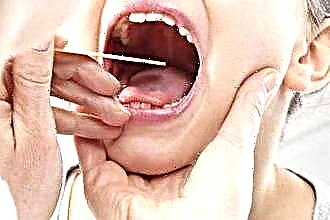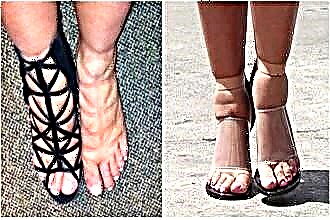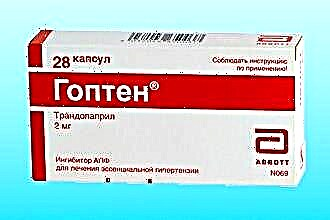Cough in babies is quite common. A child's immune system is weaker than that of an adult, and thermoregulation processes are slower. Therefore, children often catch colds and "catch" viruses and infections. The first symptoms of such diseases are cough and runny nose, which are more or less common in any child. Usually, in the absence of a high temperature, mothers take it calmly and cope with problems with home remedies. But if a child has a cough to vomiting, the pediatrician should decide how to treat it.
Caution: whooping cough!
 It is imperative to show the doctor a child with a severe cough first of all in order to make sure that it is not caused by whooping cough, a serious infectious disease that most often affects children under the age of 5 years. It is dangerous because it is difficult to recognize it at the initial stage. The disease is perfectly disguised as a common cold and may not even give a high temperature.
It is imperative to show the doctor a child with a severe cough first of all in order to make sure that it is not caused by whooping cough, a serious infectious disease that most often affects children under the age of 5 years. It is dangerous because it is difficult to recognize it at the initial stage. The disease is perfectly disguised as a common cold and may not even give a high temperature.
A severe cough appears on about 7-10 days of the disease, when the periodic coughing is suddenly replaced by a harsh, dry, barking, suffocating cough that does not respond to treatment with medicines or home remedies. At this stage, there are other symptoms characteristic of whooping cough:
- sudden, increasingly recurring coughing fits;
- severe deterioration and vomiting at night;
- redness of the face, watery eyes, protruding tongue when coughing;
- characteristic hoarse sound when breathing.
Usually, these signs are already enough for an experienced pediatrician to make a preliminary diagnosis. To confirm your assumption, a good doctor will definitely prescribe a sputum test for microflora. And if the causative agent of the disease is sown, treatment can begin.
Today, a child with whooping cough is placed in a hospital only if there is a real threat to the child's life: the temperature is constantly very high, or he suffocates when he coughs. But more often the disease is treated on an outpatient basis. The baby is prescribed bed rest and drug therapy. When the temperature drops to 37-37.5, warming up is connected to the treatment. Warm drinks and a gentle diet without spicy, salty, fatty and fried foods help accelerate recovery. The baby should be under the supervision of a doctor until complete recovery.
Other reasons
 But children with whooping cough, fortunately, rarely get sick. In most cases, a strong, vomiting cough, causes much less dangerous causes, which should not be ignored anyway:
But children with whooping cough, fortunately, rarely get sick. In most cases, a strong, vomiting cough, causes much less dangerous causes, which should not be ignored anyway:
- Colds, acute respiratory infections, ARVI. It causes inflammation of the back wall of the larynx and upper respiratory tract, which provokes a cough. In young children, he often vomits. After all, their cough and vomiting centers are located too close to each other and the excitement of one of them is transmitted to the other. Even if the child has strong immunity, it is advisable not to ignore the cough. He needs to be provided with bed rest, warm drinks, warming procedures. In no case should you give your baby antibiotics on your own, especially since in most cases it is quite possible to replace them with folk remedies for coughing.
- Persistent runny nose. Some children have persistent nasal discharge. There are many reasons for their appearance. It may be too dry or hot air in the room, allergic reactions, insufficient care of the baby's nose, due to which dust and mucus accumulate in it. If the nose is not cleared regularly and the runny nose is not dealt with, snot will run down the back of the larynx, irritating it and causing a violent cough to vomit. If untreated, bronchitis develops in this case, which can turn into pneumonia.
- Severe allergies. In this case, a coughing fit occurs due to swelling of the larynx, as a result of which air is blocked. The cough in this case is sharp, strong, accompanied by redness of the face and a feeling of suffocation. Usually mothers know that their child is allergic. But a new allergen can appear suddenly and trigger an attack of severe coughing. In this case, only an antihistamine will help to remove it. It is very important to identify the allergen as soon as possible and try to completely eliminate its effect on the child.
 Foreign body. Every mother has faced this problem at least once in her life. It is difficult to keep track of a small child. Left unattended, he strives to shove whatever came to hand into his nose or mouth. Especially in those periods when active teething begins. When a foreign body enters the throat, the larynx is reflexively closed to prevent its penetration further into the respiratory tract. At the same time, a very strong cough begins, often with vomiting, with the help of which the body pushes the foreign object out. Therefore, if an absolutely healthy child suddenly coughed violently, an urgent need to examine the oral cavity. And if there really is a foreign body, and it is deep, immediately call an ambulance.
Foreign body. Every mother has faced this problem at least once in her life. It is difficult to keep track of a small child. Left unattended, he strives to shove whatever came to hand into his nose or mouth. Especially in those periods when active teething begins. When a foreign body enters the throat, the larynx is reflexively closed to prevent its penetration further into the respiratory tract. At the same time, a very strong cough begins, often with vomiting, with the help of which the body pushes the foreign object out. Therefore, if an absolutely healthy child suddenly coughed violently, an urgent need to examine the oral cavity. And if there really is a foreign body, and it is deep, immediately call an ambulance.
Now, knowing all the possible reasons why a child may have a severe cough, reaching vomiting, you understand that there is no universal recipe for how to cope with it and cannot be.
How to relieve an attack
Of course, a sharp, strong cough, which can cause vomiting, requires compulsory treatment. But until the exact cause is found out, it is necessary to relieve the attacks by any possible means and try to make them less frequent and intense.
 Quite simple means can help with this:
Quite simple means can help with this:
- Warm milk with baking soda. Milk deeply warms the throat, neutralizes toxins and creates a thin protective film on the mucous membrane, quickly relieving irritation. Baking soda softens dry coughs and promotes the discharge of phlegm. Heat a glass of milk to 70-80 degrees, add a pinch of soda, stir and give the baby a drink in small sips. You can add a teaspoon of cocoa butter, goat or badger fat, ghee.
- Onion milk. Onions have excellent bactericidal properties, so onion milk can help even at an early stage of infectious diseases. You need to take 3-4 medium onions, peel them and cut into 6-8 pieces. Pour over a liter of milk and simmer for 15-20 minutes. When the milk has cooled, strain and add a tablespoon of honey. Give your baby a teaspoon 5-6 times a day.
- Figs in milk. It relieves even a very strong dry cough well, has a pleasant taste, contains many vitamins and trace elements that stimulate the child's immunity. The preparation is very simple. We take 3-4 fresh or dried fig berries, fill in with two glasses of milk and cook for 20-30 minutes. The medicine in this case is the fig itself. An older child can eat a bite himself. And for babies, you can interrupt the mixture with a blender and give a teaspoon 3-4 times a day.
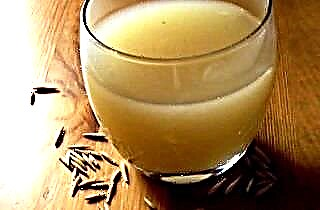 Oat broth. It is made from whole oats or regular rolled oats without any flavorings. The thick, jelly-like mucus that forms when oats is boiled helps to quickly stop coughing. It coats the sore throat, moisturizes the mucous membrane and relieves inflammation. Pour a glass of rolled oats with half a liter of clean water and cook over low heat until a slimy broth is formed. Express the mucus and give the child a teaspoon 4-5 times a day.
Oat broth. It is made from whole oats or regular rolled oats without any flavorings. The thick, jelly-like mucus that forms when oats is boiled helps to quickly stop coughing. It coats the sore throat, moisturizes the mucous membrane and relieves inflammation. Pour a glass of rolled oats with half a liter of clean water and cook over low heat until a slimy broth is formed. Express the mucus and give the child a teaspoon 4-5 times a day.- Dill-anise water. An excellent cough syrup that is easy to make at home. Anise seeds have excellent anti-inflammatory and expectorant properties, while fennel seeds soothe coughs and sore throats.Take a tablespoon of anise and dill seeds each, pour them over with two glasses of clean water and simmer for 30 minutes. Wrap and let it brew for at least 2 hours. Strain and give the baby a teaspoon 3 times a day.
But it is important to understand that folk remedies can only alleviate the condition. In most cases, they do not have a significant effect on the very cause of coughing before vomiting. Therefore, if severe attacks are repeated within a few days even after home treatment, it is necessary to show the baby to the doctor.
Medications
 We strongly do not recommend using drugs for children without a doctor's prescription. Especially when it comes to a baby or a child under the age of 2 years. Even the safest drugs in case of an overdose or improper use can cause side effects in babies: diarrhea, indigestion, vomiting, allergies. In addition, the choice of medicines directly depends on the diagnosis, which is very difficult for a mother to put correctly without the help of a pediatrician.
We strongly do not recommend using drugs for children without a doctor's prescription. Especially when it comes to a baby or a child under the age of 2 years. Even the safest drugs in case of an overdose or improper use can cause side effects in babies: diarrhea, indigestion, vomiting, allergies. In addition, the choice of medicines directly depends on the diagnosis, which is very difficult for a mother to put correctly without the help of a pediatrician.
Depending on the causes of cough, children are usually prescribed:
- Antihistamines. They are used not only for allergic coughs. They are effective for rhinitis, bronchitis and other diseases accompanied by profuse mucous secretions and laryngeal edema. Usually used "Diazolin", "Claritin", "Supratin", "Astemizol", "Zirtek".
- Antitussives. Suppress the cough reflex. They are used for whooping cough and dry, unproductive coughs, when the doctor is sure that there is no accumulation of mucus in the bronchi and lungs of the child. Otherwise, taking antitussives can provoke bronchostasis and even pneumonia. For the treatment of children can be used: "Sinekod", "Codelak", "Panatus", "Bronholitin", "Libeksin".
- Expectorants. Promotes thinning and intensive coughing of mucus. It is prescribed for rhinitis, bronchitis. Do not use with antitussives! Most often, children are prescribed syrups "Lazolvan", "Ambrobene", "Gedelix", "Pertussin", "Stoptussin".
- Antiviral. Help the immune system fight viruses faster. They differ from antibiotics in that they do not suppress the immune system and have practically no side effects. The best remedies for children are: "Interferon", "Remantadin", "Teraflu", "Arbidol", "Anaferon".
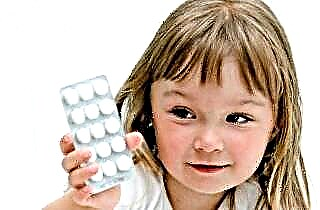 Antibacterial. They are prescribed for the infectious nature of the cough. But they have a detrimental effect not only on the pathogenic, but also on the beneficial microflora. Therefore, after a course of antibiotic treatment, the baby must be prescribed drugs that restore it. Most often, broad-spectrum antibiotics are used to treat children. We do not give the names on purpose, since their selection and determination of dosage should be carried out exclusively by a pediatrician, individually, taking into account the age and weight of the child, the characteristics of the course of the disease.
Antibacterial. They are prescribed for the infectious nature of the cough. But they have a detrimental effect not only on the pathogenic, but also on the beneficial microflora. Therefore, after a course of antibiotic treatment, the baby must be prescribed drugs that restore it. Most often, broad-spectrum antibiotics are used to treat children. We do not give the names on purpose, since their selection and determination of dosage should be carried out exclusively by a pediatrician, individually, taking into account the age and weight of the child, the characteristics of the course of the disease.
Antipyretic drugs are given to the baby only at a very high temperature - more than 38 degrees. An elevated temperature is detrimental to most pathogenic microorganisms, and it helps the child to cope with the infection faster. Therefore, it is impossible to knock it down without good reason - this will weaken the body's defense reaction.
Prevention measures
You can cure a severe cough that comes to vomiting. But it is better not to let it appear. For this you need:
 do not leave the symptoms of a cold and cough in the child unattended, start treatment immediately;
do not leave the symptoms of a cold and cough in the child unattended, start treatment immediately;- maintain cleanliness and moderate humidity in the room where the child is constantly located;
- provide the baby with good nutrition, rich in vitamins and minerals;
- walk in the fresh air for at least 2 hours a day, in bad weather - at least 30 minutes;
- dress the baby in accordance with the weather conditions, avoiding hypothermia and overheating;
- try to find an opportunity to leave the child at home during mass respiratory diseases in child care facilities and not to visit crowded places with him.
It is equally important to monitor the physical activity of the baby, regularly do exercises and hardening procedures with him.
Remember that a strong baby, even if he is sick, copes with the disease many times faster without the use of potent drugs.

 Foreign body. Every mother has faced this problem at least once in her life. It is difficult to keep track of a small child. Left unattended, he strives to shove whatever came to hand into his nose or mouth. Especially in those periods when active teething begins. When a foreign body enters the throat, the larynx is reflexively closed to prevent its penetration further into the respiratory tract. At the same time, a very strong cough begins, often with vomiting, with the help of which the body pushes the foreign object out. Therefore, if an absolutely healthy child suddenly coughed violently, an urgent need to examine the oral cavity. And if there really is a foreign body, and it is deep, immediately call an ambulance.
Foreign body. Every mother has faced this problem at least once in her life. It is difficult to keep track of a small child. Left unattended, he strives to shove whatever came to hand into his nose or mouth. Especially in those periods when active teething begins. When a foreign body enters the throat, the larynx is reflexively closed to prevent its penetration further into the respiratory tract. At the same time, a very strong cough begins, often with vomiting, with the help of which the body pushes the foreign object out. Therefore, if an absolutely healthy child suddenly coughed violently, an urgent need to examine the oral cavity. And if there really is a foreign body, and it is deep, immediately call an ambulance. Oat broth. It is made from whole oats or regular rolled oats without any flavorings. The thick, jelly-like mucus that forms when oats is boiled helps to quickly stop coughing. It coats the sore throat, moisturizes the mucous membrane and relieves inflammation. Pour a glass of rolled oats with half a liter of clean water and cook over low heat until a slimy broth is formed. Express the mucus and give the child a teaspoon 4-5 times a day.
Oat broth. It is made from whole oats or regular rolled oats without any flavorings. The thick, jelly-like mucus that forms when oats is boiled helps to quickly stop coughing. It coats the sore throat, moisturizes the mucous membrane and relieves inflammation. Pour a glass of rolled oats with half a liter of clean water and cook over low heat until a slimy broth is formed. Express the mucus and give the child a teaspoon 4-5 times a day. Antibacterial. They are prescribed for the infectious nature of the cough. But they have a detrimental effect not only on the pathogenic, but also on the beneficial microflora. Therefore, after a course of antibiotic treatment, the baby must be prescribed drugs that restore it. Most often, broad-spectrum antibiotics are used to treat children. We do not give the names on purpose, since their selection and determination of dosage should be carried out exclusively by a pediatrician, individually, taking into account the age and weight of the child, the characteristics of the course of the disease.
Antibacterial. They are prescribed for the infectious nature of the cough. But they have a detrimental effect not only on the pathogenic, but also on the beneficial microflora. Therefore, after a course of antibiotic treatment, the baby must be prescribed drugs that restore it. Most often, broad-spectrum antibiotics are used to treat children. We do not give the names on purpose, since their selection and determination of dosage should be carried out exclusively by a pediatrician, individually, taking into account the age and weight of the child, the characteristics of the course of the disease. do not leave the symptoms of a cold and cough in the child unattended, start treatment immediately;
do not leave the symptoms of a cold and cough in the child unattended, start treatment immediately;